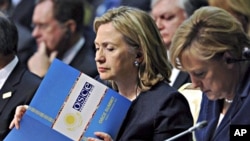U.S. Secretary of State Hillary Clinton, at the Organization for Security and Cooperation in Europe Summit in Kazakhstan's capital, Astana, has urged an enhanced OSCE role in settling regional conflicts and promoting human rights. Clinton also sealed an agreement under which Belarus will give up its enriched uranium stockpile.
The summit comes amid observances of the 35th anniversary of the Helsinki accords which, gave birth to the OSCE structure. Clinton joined other delegates here in urging a renewal of the 56-nation grouping's role in promoting human rights and regional peacemaking.
The summit is the first for the OSCE since 1999 and the first to be held in a former Soviet republic. It is being used by the Kazakh government to showcase its new capital and economic advances, despite its widely-criticized performance on human rights.
At a meeting with civil society activists and students on the eve of the summit, Clinton pressed Central Asian states to expand democratic freedoms and mentioned the case of a jailed Kazakh rights defender, Yevgeny Zvotis.
In her policy message to the summit plenary, Clinton said all OSCE members need to "make good" on the human rights commitments they undertook with the OSCE's founding.
"It is not enough for a constitution to guarantee freedom of the press if, in reality, journalists are put under pressure and even assaulted," said Secretary Clinton. "In fact, it is not enough just to hold elections. The whole process must be free and fair, with the benefit of monitoring by the OSCE. And once in office, elected officials must govern democratically and build strong institutions. Yes, the list is long. But we're not asking participating states to accept new principles and rights, only to honor existing commitments."
Clinton is urging the OSCE to play a greater role in supporting the Afghan government and says the organization needs to be empowered to respond more effectively to conflicts within the OSCE itself.
She is calling for the early resumption of talks aimed at resolving the issue of the separatist Moldovan region, Transnistria, and renewed efforts to settle the dispute between Armenia and Azerbaijan over Nagorno-Karabakh.
Clinton says it is encouraging that Russia has recently endorsed expanded capabilities for the OSCE, but laments Moscow's exclusion of OSCE monitors from the breakaway Georgian areas of Abkhazia and South Ossetia following its brief conflict with Georgia in 2008.
"It is regrettable that a participating state has proposed to host a mission and the OSCE has not been allowed to respond," she added. "We here at this table must let this organization do its job, and restore a meaningful OSCE presence to Georgia. We also call on all parties to fully respect and implement the August and September 2008 ceasefire arrangements."
After a meeting on the sidelines of the summit, Clinton and Belarus Foreign Minister Sergey Martynov announced an agreement under which Belarus will eliminate, with American assistance, its stockpile of highly-enriched uranium.
When the United States hosted Nuclear Security Summit in April, Belarusian President Alexander Lukashenko said his country had hundreds of kilograms of such material and that it would not bend to international pressure to give it up.
The announcement marks another step in a recent thaw in U.S. relations with the authoritarian Lukashenko government.
A joint statement after the Clinton-Martynov meeting said both acknowledged that enhanced respect for democracy and human rights "remains central" to improved relations.
It said the United States looks for substantial progress from the country's presidential election December 19th, and that the Minsk government's decision to allow "robust" international monitoring is a welcome step.




